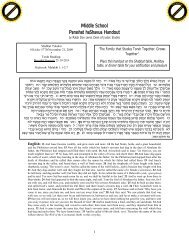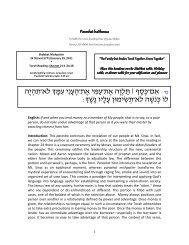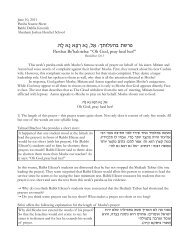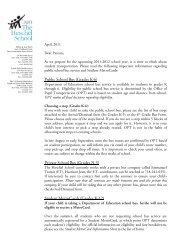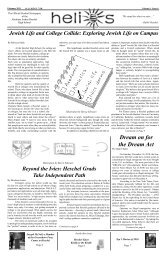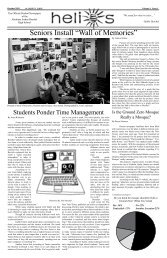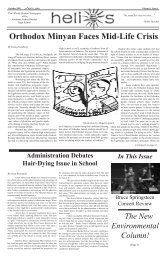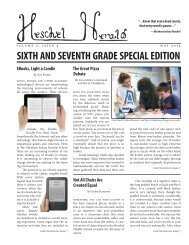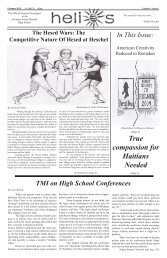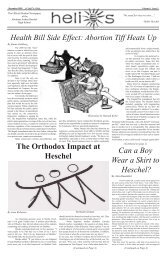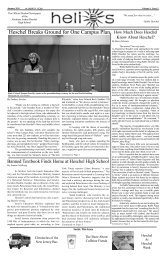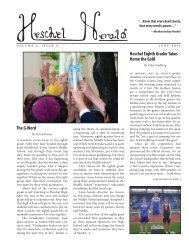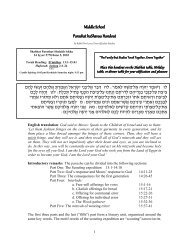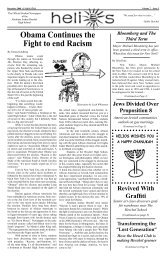Volume 8 Issue 6, May 2010 - The Heschel School
Volume 8 Issue 6, May 2010 - The Heschel School
Volume 8 Issue 6, May 2010 - The Heschel School
You also want an ePaper? Increase the reach of your titles
YUMPU automatically turns print PDFs into web optimized ePapers that Google loves.
סיון ה“תש‘ ע<br />
<strong>May</strong> <strong>2010</strong><br />
Helios <strong>Volume</strong> 8 <strong>Issue</strong> 6 <strong>Volume</strong> 8 <strong>Issue</strong> Page 61<br />
<strong>The</strong> Official Student Newspaper<br />
of the<br />
Abraham Joshua <strong>Heschel</strong><br />
High <strong>School</strong><br />
“We stand for what we utter…”<br />
- Rabbi <strong>Heschel</strong><br />
<strong>Heschel</strong> Revises Kashrut Policy<br />
By Becca Schwarz<br />
the school.<br />
named student feels it is “ridiculous that you can be<br />
Members of the student body expressed a suspended if you share cake three times.” In fact,<br />
In response to a recent Helios article regarding<br />
adherence to the <strong>Heschel</strong> High <strong>School</strong>’s David Mishaan, a <strong>Heschel</strong> junior, believed the treats for their friends.<br />
broad range of opinions regarding the guidelines. many students like to bring in birthday cakes and<br />
kashrut policy, the administration decided to clarify policy to be a “good compromise.” Another student Some find the no-sharing guideline to be<br />
the guidelines and communicate them to the student<br />
body in grade meetings. On Thursday, April think the culture of the school is such that people feel no-sharing rule will be problematic. “Sharing is<br />
agreed, claiming, “<strong>The</strong> new severity is very good… I unrealistic. Junior Anna Rothstein worries that the<br />
15, each grade heard the amended policy from their accomplished when they successfully eat a ham and caring, right?”<br />
grade dean, and parents were notified of the guidelines.<br />
deserve to get caught.”<br />
were strict enough as they were and that they should<br />
swiss in the building, and I think that’s rude and they Some students feel that the kashrut rules<br />
<strong>The</strong> kashrut rules read:<br />
not have been changed.<br />
Individuals are asked to bring<br />
Aaron <strong>May</strong>er, a <strong>Heschel</strong><br />
only cold dairy or parve (nonmeat,<br />
non-dairy) products into<br />
people be allowed to eat a pop-<br />
freshman, said, “Why shouldn’t<br />
the school. To maintain the<br />
tart if it’s not hurting anyone?<br />
kashrut of our cafeteria, all<br />
Rather, we should initiate some<br />
outside food must be eaten in<br />
form of a ‘don’t ask, don’t tell’<br />
other spaces in the building.<br />
policy and allow every food but<br />
Students may not order in food<br />
enforce the no-sharing rule.”<br />
from any establishment during<br />
Often, tours are given during the<br />
the school day. After school<br />
school day to show <strong>Heschel</strong> to<br />
hours, students may bring in<br />
potential students and their families.<br />
Maintaining the image of<br />
cold dairy or parve foods (as<br />
described above) or kosher<br />
the <strong>Heschel</strong> <strong>School</strong> as a kosherfriendly<br />
place is very important.<br />
certified hot, dairy (i.e. pizza)<br />
or parve (non-meat, non-poultry)<br />
food emphasized this concern. “If a<br />
Beatrice Volkmar, a junior,<br />
<strong>The</strong> real changes regard<br />
cold food and the con-<br />
school saw a kid eating an un-<br />
parent from <strong>Heschel</strong> or another<br />
sequences that may follow if<br />
kosher meat sandwich… That<br />
students do not adhere to the<br />
would just be a very bad reflection<br />
on <strong>Heschel</strong> as a Jewish<br />
guidelines. If students fail to<br />
follow the guidelines, first time<br />
school.”<br />
offenders are punished with a<br />
<strong>Heschel</strong> faculty framed the<br />
reminder and parents are contacted.<br />
A second transgression<br />
Illustration by Julie Maschler<br />
teachers felt that the policy was<br />
kashrut issue differently. Many<br />
results in a detention and parents<br />
are contacted again. After a third violation of Preferring to remain anonymous for fear that term “kosher ingredients,” claiming that the indefi-<br />
far too vague in its use of the<br />
the kashrut rules, a student can be suspended. Upperclassmen<br />
may also lose their off-campus privi-<br />
a second student said, “It is sad that a Jewish school observe the school’s kashrut rules, as well as for the<br />
her comment would be considered too inflammatory, nite meaning makes it hard for students to properly<br />
leges.<br />
needs these rules at all… Why would anyone bring administration to fairly impose consequences.<br />
<strong>The</strong> <strong>Heschel</strong> Handbook states that these blatantly unkosher food into any kind of Jewish institution?<br />
I am embarrassed that we have to take away cy] is a nice refresher,” said junior Sami Stein. “If we<br />
“Regardless of the changes, [the new poli-<br />
rules are enforced in order to ensure that “all members<br />
of our community should feel comfortable eating<br />
at both lunch and school functions.” Indeed, the to bring up a third-time punishment.”<br />
policy they’ll be more inclined to think about it next<br />
someone’s going out privileges and that we even have just remind students of the fact that there is a kashrut<br />
main issue at hand is one of respect by students for On the other side of the spectrum, an un-<br />
time they decide to bring in a meat sandwich.”<br />
Dissecting the Ethics of Dissection<br />
By Emma Goldberg<br />
In early 2001 sixth grader Laurie Wolff<br />
of Clark Country, Nevada, petitioned her school<br />
board to provide alternatives<br />
to middle school students who<br />
felt uncomfortable with the<br />
school’s mandatory dissection<br />
policy. Wolff was angered<br />
when her refusal to participate<br />
in several class dissections reduced<br />
her A-average in biology<br />
to a C.<br />
In the past two years,<br />
cow kidney dissections have<br />
been added to <strong>Heschel</strong>’s 11th<br />
grade biology curriculum. Science<br />
teacher Jon Greenberg<br />
explained the rationale behind<br />
the new curriculum. “Dissection<br />
is helpful because it’s a direct<br />
experience. You can look<br />
at pictures and diagrams, but<br />
if you don’t actually see it you<br />
can’t fully understand it.”<br />
Jon’s view has become<br />
widespread in United States<br />
high schools. <strong>Heschel</strong> is among<br />
the many New York public and<br />
private schools to include dissection<br />
in the curriculum.<br />
Proponents of dissections say it helps to make more<br />
tangible the abstract concepts learned in a biology<br />
lab. As an alternative to listening to lectures and<br />
taking notes, dissections actively engage students<br />
in studying anatomy.<br />
Though some <strong>Heschel</strong> juniors recalled dissecting<br />
owl pellets in a fifth grade biology class, for<br />
most the cow kidney dissection was an entirely new<br />
experience.<br />
Matan Skolnik, a <strong>Heschel</strong> junior, believes<br />
dissection is a helpful educational tool. “My class is<br />
Illustration by Joshua Ashley<br />
supposed to be a lab-based, more hands-on class, and<br />
it would be very helpful and interesting to be able to<br />
actually tangibly study the material we are learning,”<br />
said Skolnik.<br />
Zoe Grossman, also a junior, said that her biology<br />
class has not yet had a dissection activity, but<br />
added: “I am sure it would add to our understanding<br />
of certain concepts being taught in the class. Doing<br />
dissections definitely make sense of certain ideas<br />
taught in the curriculum.”<br />
Junior David Mishaan said, “I must admit,<br />
I enjoyed the activity.”<br />
However, biology dissection<br />
was not a positive experience<br />
for all <strong>Heschel</strong> High<br />
students. Some students expressed<br />
dismay at the addition<br />
of dissection to the 11th<br />
grade biology curriculum.<br />
Other in this students contrasted<br />
Veguary, issue: a student-driven<br />
venture capable of rallying<br />
456 articles individuals to pledge<br />
vegetarianism for one<br />
month, with the image of<br />
an 11th grade biology class<br />
sorting through the bones<br />
and marrow of a dead cow.<br />
Hannah Kober, a junior<br />
and member of the <strong>Heschel</strong><br />
High <strong>School</strong> Vegetarian and<br />
Animal Rights Club, spoke<br />
out against recent dissections.<br />
Hannah said, “I don’t<br />
believe that is it wrong to<br />
dissect in the context of labs<br />
with scientific experts, but<br />
wasting all those kidneys on<br />
amateurs is simply insane.”<br />
An estimated six million animals are killed<br />
for dissection purposes each year in United States<br />
high schools alone, while many others are killed for<br />
use in elementary and middle school biology classrooms.<br />
Continued on page 3
Page 2 Helios <strong>Volume</strong> 8 <strong>Issue</strong> 6 <strong>May</strong> <strong>2010</strong><br />
Commemorate then Celebrate?<br />
By Anna Rothstein<br />
On April 12, Ahuva sent an e-<br />
mail informing the entire school that<br />
high school chef, Rami Mishani, would<br />
be leaving for one year to participate<br />
on “Krav Sakinim,” the Israeli version<br />
of Iron Chef. Ahuva notified<br />
the students and<br />
faculty that on the next<br />
Friday during lunch, the<br />
school would “officially<br />
give Rami a <strong>Heschel</strong><br />
send-off in recognition<br />
of all the wonderful<br />
times and meals he has<br />
provided us.”<br />
Students have<br />
grown close to Rami<br />
over the seven years he<br />
has been at <strong>Heschel</strong>.<br />
Many are fond of his<br />
cooking and his presence<br />
every day during<br />
lunch. After Ahuva’s<br />
announcement, there<br />
were days of frantic<br />
discussion. Students<br />
were devastated and<br />
complained that they<br />
couldn’t wait an entire<br />
year to enjoy Rami’s<br />
gourmet meals again.<br />
Seniors Matt Grobman and<br />
Shelly Kaplan went around the school<br />
asking students what their favorite<br />
“Rami meal” was. Hours were spent<br />
putting together a goodbye video for<br />
Rami. That Friday the video was shown<br />
in the cafeteria to the entire school.<br />
But what was thought to be a goodbye<br />
ceremony was actually a <strong>2010</strong> color<br />
war breakout!<br />
<strong>The</strong> first activity of color war<br />
was decorating the halls Freshman<br />
White, Sophomore Red, Junior Blue,<br />
and Senior Black. Students from each<br />
grade signed up for the various competitions<br />
that would be part of the color<br />
war. Everyone showed lots of color war<br />
and grade spirit in a game of knockout.<br />
<strong>The</strong> Monday of color war began solemnly<br />
commemorating Yom Hazikaron.<br />
During tfillot, a misheberach<br />
was recited, a prayer for sick and injured<br />
Israeli soldiers. Immediately following<br />
tfillah an assembly took place<br />
in commemoration of fallen soldiers.<br />
Rabbi Benji Shiller spoke about his<br />
experiences in the army, the <strong>Heschel</strong><br />
Harmonizers performed, and student<br />
musicians played music and sang.<br />
An important question was how the<br />
day would transform from something<br />
so solemn and emotionally challenging<br />
to something cheerful and spirited.<br />
Rabbi Natan worked hard at making<br />
the transition from Yom Hazikaron to<br />
color war happen.<br />
Team captains from each<br />
grade stood in front of the school and<br />
transformed from their black and white<br />
clothes to their color war attire of<br />
white, red, blue, and black. Many students<br />
found this transition to be “awkward”<br />
or uncomfortable.<br />
Junior Sharon Amir said “I<br />
wasn’t offended or anything but naturally,<br />
I was in ‘sad’ mode [during Yom<br />
Hazikaron] so later being all cheery<br />
was a little hard.”<br />
A student who wished to remain<br />
anonymous commented, “Going<br />
into color war, something fun and<br />
slightly chaotic, seemed to take away<br />
from the Yom Hazikaron<br />
atmosphere.” Junior Ari<br />
Meridy said, “It struck a<br />
personal note because I<br />
have friends in tzahal right<br />
now, and going immediately<br />
from [one] to the<br />
other was challenging.”<br />
Others did not find<br />
the transition problematic.<br />
Junior Ariel Abecassis<br />
said, “It wasn’t that hard<br />
because we were in an environment<br />
where it’s not<br />
really different than any<br />
other day, the only real<br />
difference was that we had<br />
a ceremony that was actually<br />
taken seriously.”<br />
Rabbi Natan emphasized<br />
that traditionally<br />
Yom Ha’atzmaut and Yom<br />
Hazikaron are marked<br />
separately on two consecutive<br />
days, a difficult transition for Israelis.<br />
This year he decided to create<br />
this type of transition Monday morning<br />
from the Yom Hazikaron ceremony<br />
to Yom Ha’atzmaut. He called Yom<br />
Ha’atzmaut in Israel “the biggest party<br />
of the year.”<br />
Monday April 19 was an emotional<br />
day for most students, making<br />
team spirit difficult. Many students<br />
felt that it was extremely challenging<br />
to play school-wide game and competitions<br />
on a day meant to commemorate<br />
both injured soldiers and soldiers<br />
who have lost their lives. Junior Becca<br />
Schwarz asks, “On a day where we are<br />
supposed to remember the fallen Israeli<br />
soldiers, how can we either participate<br />
fully in color war or keep them in our<br />
hearts and minds when we do so?”<br />
Racial Profiling:<br />
Immoral, Important, or Both?<br />
By Zoe Goldberg<br />
On December 25, 2009,<br />
Umar Abdulmutallab smuggled a<br />
bomb onto an airplane in his underwear.<br />
A few days later, on January<br />
3, a man ran through Newark<br />
International airport security,<br />
causing a long delay for many<br />
passengers.<br />
<strong>The</strong>se are just two<br />
examples of recent terrorist<br />
threats to airport security.<br />
Why do travelers have to wait<br />
in long security lines, take<br />
off their shoes, and throw out<br />
bottles of water at the airport<br />
if these measures do not solve<br />
all of the security problems?<br />
Many people think racial profiling<br />
is a good way to help<br />
ensure airport security. However,<br />
this is a very controversial<br />
technique.<br />
Some people say that<br />
it does not matter if people<br />
feel offended or angered by<br />
being pulled over and questioned<br />
at the airport, it is necessary in order<br />
to ensure the safety of the passengers,<br />
as statistics suggest that it is<br />
more likely for an Arab, Pakistani, or<br />
North African Muslim man to be a<br />
Illustration by Talia Niederman<br />
terrorist than a white Catholic woman.<br />
However, many people argue<br />
that racial profiling is highly<br />
discriminatory. <strong>The</strong>y say that just<br />
because some Arab men happen to<br />
Illustration by Andrew Udell<br />
be terrorists does not mean that every<br />
Arab man should be targeted at<br />
the airport. Many believe security<br />
officials should focus only on suspicious<br />
behavior rather than on someone’s<br />
race.<br />
People also argue that racial<br />
profiling violates the Fourth<br />
Amendment to the Constitution,<br />
which states that: “<strong>The</strong> right of the<br />
people to be secure in their persons,<br />
houses and effects, against<br />
unreasonable searches and<br />
seizure, shall not be violated,<br />
and no warrants shall<br />
issue, but upon probable<br />
cause, supported by Oath or<br />
Affirmation, anvd particularly<br />
describing the place to<br />
be searched and the persons<br />
or things to be seized.”<br />
<strong>Heschel</strong> students also<br />
hold strong opinions on<br />
the subject of racial profiling.<br />
While some think it is<br />
a necessary measure to ensure<br />
the safety of the American<br />
people, other <strong>Heschel</strong><br />
students feel that racial<br />
profiling is immoral and un-<br />
<strong>Heschel</strong>ian.<br />
One student commented,<br />
“It is just one small way<br />
that security can try to stop terrorist<br />
attacks,” but another student<br />
said, “It’s not rational. Why should<br />
some guy get stopped at security<br />
just because his skin is darker than<br />
another person? It’s a rude, offen-<br />
Helios Staff<br />
2009-<strong>2010</strong><br />
Editors:<br />
Gabriel Fisher<br />
Emma Goldberg<br />
Art and Layout Editors:<br />
Talia Niederman<br />
Andrew Udell<br />
Sports Editor:<br />
Gabriel Klausner<br />
Contributing Writers:<br />
Naomi Blech<br />
Rebecca Cooper<br />
Gabriel Fisher<br />
Emma Goldberg<br />
Zoe Goldberg<br />
Gabriel Klausner<br />
Jesse Kramer<br />
Aaron Ladds<br />
Isabel Merrin<br />
Elizabeth Rauner<br />
Anna Rothstein<br />
Mani Schlisser<br />
Becca Schwarz<br />
Zachary Stecker<br />
Rachel Weisberg<br />
Andrew Udell<br />
Contributing Artists:<br />
Joshua Ashley<br />
Hannah Kober<br />
Rebecca Leeman<br />
Julie Maschler<br />
Talia Niederman<br />
Sigal Palley<br />
Andrew Udell<br />
Faculty and Staff:<br />
Lisa Cohen<br />
Gabe Godin<br />
Audrey Sieger<br />
We would like to formally thank<br />
Samuel Freedman. His dedication<br />
has helped us move Helios to the<br />
next level.<br />
Printing courtesy of Tri-Star<br />
Offset & Barry Goodman<br />
Letter From<br />
<strong>The</strong> Editors<br />
Dear Readers:<br />
In the last issue in “<strong>The</strong> Pig in the<br />
Room: <strong>Heschel</strong>’s Obvious but Overlooked<br />
Kashrut Problem,” the first<br />
paragraph stated that, at a meeting of<br />
Student Senate, principal Ahuva Halberstam<br />
knowingly saw a student eating<br />
an non-kosher slice of hot pizza,<br />
but chose to accept it. Ahuva was not<br />
contacted, however, to verify that interpretation.<br />
Ahuva has informed Helios<br />
that she had not been aware that<br />
the pizza was non-kosher.<br />
Also, despite a statement in an editorial<br />
in the last issue, Ahuva will continue<br />
to work collaboratively with the<br />
Helios staff.<br />
<strong>The</strong> names of staff members Rebecca<br />
Schwarz and Rachel Weisberg were<br />
inadvertently omitted in the staff list of<br />
the last issue.<br />
Finally, an error occurred in the layout<br />
of the last issue, inserting part of the<br />
article “Tightening the Rope on <strong>School</strong><br />
Dances” into the body of “Are We the<br />
Pro-Israel Anomaly?”<br />
Helios is committed to maintaining<br />
high journalistic standards and will<br />
work to prevent such misstatements<br />
and errors in the future.<br />
<strong>The</strong> Editorial Staff of Helios
<strong>May</strong> <strong>2010</strong> Helios <strong>Volume</strong> 8 <strong>Issue</strong> 6 Page 3<br />
Dissection continued from page 1<br />
Many junior biology students,<br />
including Ciara Sidell and Shevi Epstein,<br />
also members of the <strong>Heschel</strong><br />
Animal Rights Club, share Hannah’s<br />
view. <strong>The</strong>y approached Jon, asking for<br />
permission to refrain from participating<br />
in the dissection activity. According<br />
to Sidell, “I was given a choice:<br />
I could either dissect the cow kidney<br />
without making a fuss, or I could sit<br />
and watch, and take in as much information<br />
as possible.” Hannah, on the<br />
other hand, claimed to have felt compelled<br />
to perform a dissection in her<br />
biology class. Jon responded that he<br />
gave his students the option to dissect<br />
a model, but encouraged actual dissection.<br />
In a recent survey by the national<br />
organization Animal Learn,<br />
86% of high school students polled<br />
stated that they believed that high<br />
school biology teachers should make<br />
classroom dissections optional. Ten<br />
states, including California, Pennsylvania,<br />
and New Jersey, have passed<br />
legislation protecting student rights to<br />
refuse participation in classroom dissection<br />
activities. <strong>Heschel</strong> is in accord<br />
with those laws by providing students<br />
with the option to dissect or not.<br />
However, for some students,<br />
such as Ciara, even being given the<br />
option to dissect can breed resentment.<br />
“On a personal note, I was<br />
somewhat offended when I was told<br />
that I had to sit and watch my classmates<br />
dissect a kidney,” said Ciara.<br />
Hannah, Ciara, and Shevi are<br />
struggling to balance their intellectual<br />
interest in biology with an interest<br />
in preserving respect for animals,<br />
especially given that all three are at<br />
least “partial” vegetarians. Hannah<br />
explained, “I am not a full vegetarian,<br />
however I don’t eat red meat because<br />
those animals are mammals just like<br />
we are, making it even more inhumane<br />
to dissect their body parts without<br />
realizing that these animals are<br />
essentially like us.”<br />
Jon responded that he purchases<br />
his dissection meat from Western<br />
Beef and as such, “<strong>The</strong> meat is<br />
just a byproduct of the meat industry.<br />
It’s not animals groomed and raised<br />
specifically for dissection.”<br />
Ciara claimed that to deepen<br />
11th grade understanding of the anatomy<br />
of cows and other living creatures,<br />
alternatives to dissection that<br />
do not breach moral codes can be<br />
found. In 28 out of 29 studies conducted<br />
by the Humane Society of the<br />
United States students who used alternative<br />
methods to dissection, such<br />
as computer simulations, performed<br />
as well or better on standardized<br />
tests.<br />
Ciara reported that the Animal<br />
Rights Club has met with Jon<br />
to discuss finding models of animal<br />
anatomy to be used as alternatives to<br />
conventional dissection. Ciara said,<br />
“As a high school student, I feel that<br />
it is important to understand the anatomy<br />
of the kidney, but I can do so<br />
in a different way, virtually, or using<br />
a model.” However, while extensive<br />
research has found that alternatives<br />
to dissection can be effective, inexpensive,<br />
and accommodating to vegetarian<br />
students, some <strong>Heschel</strong> students<br />
and teachers remain opposed to<br />
removing dissection from the junior<br />
biology curriculum.<br />
Though Jon acknowledged<br />
that there are alternatives to dissection,<br />
he explained that if “you’re taking<br />
apart a virtual frog, it’s not the<br />
same tactile experience as a true dissection.”<br />
Junior Charlotte Marx-Arpadi<br />
agreed, and added: “Dissection<br />
brings all that we learn in biology to<br />
life. Instead of memorizing facts for<br />
a test, through dissection I get to understand<br />
biology in real life form.”<br />
By Andrew Udell<br />
<strong>Heschel</strong> Holds First<br />
Technology Recycling Drive<br />
<strong>The</strong> Sustainability Committee<br />
at <strong>Heschel</strong>, a group focused on improving<br />
and promoting environmentalism<br />
in all three <strong>Heschel</strong> buildings, recently<br />
ran a technology drive to collect<br />
electronic waste (e-waste) for proper<br />
recycling.<br />
<strong>The</strong> Sustainability Committee<br />
hoped that lower, middle, and high<br />
school <strong>Heschel</strong> families would bring<br />
everything from computers, printers,<br />
and cell-phones, to TVs, all e-waste<br />
that can be safely and properly recycled.<br />
Why should e-waste be recycled?<br />
Electronic waste contains many<br />
dangerous toxins such as mercury,<br />
phosphors, cadmium, and flame retardants.<br />
According to the Environmental<br />
Protection Agency, e-waste contributes<br />
more than 70% of the toxins found in<br />
landfills, although in volume it constitutes<br />
only 1% of landfills.<br />
As chemistry teacher Isaac Secemski<br />
explained, the esoteric metals<br />
(found in almost all of the technology<br />
that we throw away or recycle) have<br />
useful and special properties. For example,<br />
he said that, “scandium is used<br />
in stadium lights, yttrium in lasers,<br />
lanthanum in electric car batteries,<br />
etc.” Virtually all of these rare metals<br />
come from China; they are usually<br />
mined under uncontrolled and very<br />
poor environmental conditions. In<br />
addition, China has strong economic<br />
control over the supply of these metals.<br />
According to Isaac, “it is a<br />
very good idea to recycle these old<br />
dergarten next year, there will already<br />
be 2nd, 1st, and kindergarten classes of<br />
75 students each, when the move takes<br />
place in the fall of 2012.<br />
Some <strong>Heschel</strong> high school students<br />
held strong views on the expansion.<br />
Junior Skyler Siegel did not understand<br />
the reasoning behind the school’s<br />
decision to expand this year, when, in<br />
his opinion, there is not enough room<br />
to hold all the students comfortably. “I<br />
think they can wait two years.”<br />
Talya Nevins, a freshman, disagreed.<br />
“If that’s what the school needs<br />
to do then they should do it,” Nevins<br />
stated. “This seems like the necessary<br />
step the school must take to ensure that<br />
in three years, when they actually relocate,<br />
the new school won’t feel empty<br />
and deserted.”<br />
Another, and arguably larger,<br />
issue is whether <strong>Heschel</strong> should expand<br />
its lower grades at all. Expanding the<br />
school next year is part of a larger plan<br />
to eventually have 75 students in every<br />
grade in the <strong>Heschel</strong> school, one of the<br />
main reasons that the school wanted to<br />
build the 60th Street campus in the first<br />
place.<br />
As Roanna explained, there is a<br />
constant and growing demand for open<br />
spots at the <strong>Heschel</strong> <strong>School</strong>. Each year<br />
the admissions office is faced with the<br />
tough decision of rejecting many students,<br />
a choice they would prefer not<br />
to make as frequently. Roanna said that<br />
she was particularly struck when she<br />
was first forced to make the decision to<br />
reject the younger sibling of a current<br />
<strong>Heschel</strong> student, something previously<br />
unheard of. Additionally, it is important<br />
to bring new families into the unique<br />
<strong>Heschel</strong> community and it is unfortunate<br />
and disheartening to have to reject<br />
so many new families each year. As she<br />
explained, “It became uncomfortable.<br />
We were turning away too many people.”<br />
<strong>The</strong>re are many, though, who<br />
oppose the decision to increase the<br />
grade size and the <strong>Heschel</strong> community.<br />
Sophomore Andrew Udell understood<br />
the arguments from both sides. “ On<br />
one hand it’s definitely nice to give the<br />
opportunity to kids and families to be<br />
members of the <strong>Heschel</strong> community,<br />
but on the other hand it definitely weak-<br />
technologies because these rare metals<br />
are recovered and this minimizes<br />
environmental damage due to dirty<br />
mining and allows us some economic<br />
freedom from Chinese pressure. In addition,<br />
some of these rare metals are in<br />
such limited supply that, unless we recycle,<br />
we will run out of them. This is<br />
important for the future because some<br />
of these metals are critical for “green”<br />
technologies, such as hybrid cars and<br />
wind turbines.”<br />
Additionally, some people argue<br />
that electronic recycling will result<br />
in decreased energy and water use, reduce<br />
pollution, and help to keep hazardous<br />
toxins out of the air and water.<br />
A law that will go into effect in July<br />
<strong>2010</strong> makes it illegal for New York<br />
City residents to throw away electronic<br />
waste.<br />
If you missed the recent technology<br />
drive, it’s never too late! Check<br />
out the Lower East Side Ecology Center<br />
for their recycling drives or visit<br />
http://www.nyc.gov/portal/site/nycgov/menuitem.59acc4afc8e9fbc880b<br />
be51001c789a0 for more information<br />
and dates for e-waste recycling programs.<br />
<strong>Heschel</strong> Prepares for Expansion:<br />
New Kindergarten Class on its Way<br />
By Gabriel Fisher<br />
Illustration by Talia Niederman<br />
As the cranes and bulldozers<br />
eagerly wait for the signal to proceed<br />
with the construction of the new <strong>Heschel</strong><br />
campus, the <strong>Heschel</strong> <strong>School</strong>’s<br />
administration is already making<br />
many changes in preparation for the<br />
big move. <strong>The</strong> plan is to construct a<br />
new <strong>Heschel</strong> complex for the lower<br />
and middle school students on two<br />
properties <strong>Heschel</strong> already owns,<br />
one that is adjacent to and the other<br />
contiguous to the current high school<br />
building. Thanks to the “extraordinary<br />
generosity,” as Head of <strong>School</strong> Roanna<br />
Shorofsky put it, of a group of<br />
10-12 donors, and a lead donation of<br />
$33 million dollars, <strong>Heschel</strong> has been<br />
able to move forward far more quickly<br />
than expected with its plans to move<br />
the lower and middle schools to 60th<br />
Street.<br />
As the school continues with<br />
its preparations for the building,<br />
which includes meeting with the architects<br />
and construction companies,<br />
the administration is also exploring<br />
ways to prepare the student body for<br />
the new location. <strong>The</strong> administration<br />
recently decided that, in anticipation<br />
of the upcoming move, it will open an<br />
additional kindergarten class for next<br />
year.<br />
Currently, the two kindergarten<br />
classes at <strong>Heschel</strong> accommodate<br />
about 50 students. Under the new<br />
plan, this number would rise to 70<br />
or 75. Although the logistics are not<br />
finalized at the moment, the current<br />
plan is to move one of the third grade<br />
classes to a remodeled library that will<br />
be created to absorb them, and the expansion<br />
class will take over the abandoned<br />
third grade classroom.<br />
<strong>The</strong> decision to expand the<br />
classes right now, as opposed to later<br />
when the new lower and middle school<br />
are built, stems from the administration’s<br />
concern about the size of the<br />
new space, a 10-story monolith with<br />
two gymnasiums, multiple entrances,<br />
and an environmental rooftop garden,<br />
<strong>The</strong> administration does not want the<br />
school to appear too big or unwelcoming,<br />
and they want the school not to<br />
seem empty. By expanding the kinens<br />
the tight-knit community. <strong>The</strong> <strong>Heschel</strong><br />
community should remain close<br />
knit and small.”<br />
Roanna recalled that years<br />
ago, when the <strong>Heschel</strong> <strong>School</strong> decided<br />
to expand from 15 to 40 students per<br />
grade, opponents made a similar argument<br />
about losing the special closeness<br />
and bond of the <strong>Heschel</strong> community.<br />
To the naysayers Roanna said, “Has<br />
<strong>Heschel</strong> ever lacked that communal<br />
feel?”<br />
Finally, by expanding the lower<br />
and middle schools to 75 students<br />
a grade, the school will effectively be<br />
making the high school admissions process<br />
for outside applicants much more<br />
selective. Because the high school is<br />
already at capacity, it means that the<br />
number of outside students joining in<br />
9th grade would shrink significantly.<br />
Right now, the rate of <strong>Heschel</strong> middle<br />
school students who continue at the<br />
high school hovers around 67%. If the<br />
same statistic applied to an 8th grade<br />
class of 75, 50 <strong>Heschel</strong> middle school<br />
students would continue at the high<br />
school, a significant increase from the<br />
30 to 35 person minority that <strong>Heschel</strong><br />
middle-schoolers currently comprise<br />
in a high school grade.<br />
Tsvi Tannin, a sophomore<br />
who came to <strong>Heschel</strong> in 9th grade,<br />
hesitantly endorsed the plan to expand<br />
the middle school. “If <strong>Heschel</strong> was in<br />
a situation where it was forced to be<br />
more selective with its admissions,” he<br />
said dubiously, “the overall quality of<br />
the high school would be dramatically<br />
improved.”<br />
Still others fear that expanding<br />
the <strong>Heschel</strong> middle school, making the<br />
high school admissions process more<br />
selective than it already is, will deny<br />
deserving students from other middle<br />
schools a <strong>Heschel</strong> education.<br />
<strong>The</strong> Helios Staff and Faculty<br />
extend condolences to Sam<br />
Freedman, Helios mentor, on<br />
the loss of his father, Herman<br />
Freedman.
Page 4 Helios <strong>Volume</strong> 8 <strong>Issue</strong> 6 <strong>May</strong> <strong>2010</strong><br />
Sports Commentary: Oh,<br />
How the NBA Has Gone Soft<br />
Gabe enjoys sports, beating Ross Gitlin<br />
in Fifa, and perusing the latest issue of<br />
<strong>The</strong> New Yorker. His column is not about<br />
spitting back scores, nor is it simply a recap<br />
of the month’s sports happenings. It’s<br />
about candid, frank, and straightforward<br />
opinion. Agree or disagree, gotta respect<br />
a man’s conviction.<br />
By Gabriel Klausner<br />
What a dark time for NBA<br />
fans. What a shame it is to tune in every<br />
night and watch a bunch of 7-foot<br />
men play the game like a bunch of kindergarten<br />
sissies.<br />
I know what you’re thinking<br />
right now. Are you insane, Klausner?<br />
Have you not seen Lebron James and<br />
Kobe Bryant put on dazzling one-of-akind<br />
performances, night in and night<br />
out? I mean, Gabe, the league has two<br />
of the greatest players ever competing<br />
night after night, and you’re trying to<br />
tell me that the NBA is a crying shame,<br />
a disgrace, and, dare I say, a shonda?<br />
Precisely.<br />
<strong>The</strong>re’s no denying the fact<br />
that the NBA is chock-full o’ phenomenal<br />
players at every position. And I<br />
can’t sit here and knock their talent, let<br />
alone disregard the obvious financial<br />
stimulation that comes along with such<br />
a rare pool of skill.<br />
But I will say this: for basketball<br />
purists like myself, the league’s<br />
defense is a joke. And it has been for<br />
too long now.<br />
In the 80’s, the “Bad Boys”<br />
of Detroit were a terror on the court.<br />
Universally recognized as the toughest<br />
and roughest defenders in the league,<br />
the Pistons would never grant anyone<br />
an easy bucket – try to drive to the basket<br />
for a layup and it’s a sure bet that<br />
you’d land on your bottom, on your<br />
way to the free throw line to earn your<br />
two points. However, physicality in the<br />
NBA has virtually vanished.<br />
Since 1990, the NBA has instituted<br />
a host of rules to increase offensive<br />
flow and penalize physical play. Two<br />
of the most detrimental and tragic rules<br />
came in 1994 and 1997. In 1994, hand<br />
checking (placing one’s hand on the offensive<br />
player intermittently to slow his<br />
or her progress) was outlawed and in<br />
1997 forearm checks went out the window<br />
as well. Free-flowing offenses are<br />
now the norm with the floor wide open.<br />
Since the ’97-’98 season, scoring average<br />
has increased by five points from 95<br />
points a game to 100 and there is an average<br />
of four more possessions per game.<br />
Many players and coaches alike<br />
are not happy with the new style of play<br />
brought on by these changes. Charlotte<br />
Bobcats coach Larry Brown said, “You<br />
can’t even touch a guy now. <strong>The</strong> college<br />
game is much more physical than our<br />
game.”<br />
And I ask, why are 18-year-old<br />
students of the game playing a more<br />
physical brand of basketball than seasoned<br />
veterans who make millions of<br />
dollars to lay it all out on the line night<br />
after night?<br />
Not only am I irked and irate with<br />
regard to how the game of basketball is<br />
played today by the best in the world, but<br />
I also, frankly, feel bad for those young<br />
National Basketball Association fans<br />
who never got to see men battle like warriors.<br />
Six-year-old Johnny who never got<br />
to see David Lee whack a driving point<br />
guard. Or 8-year-old Casey who never<br />
got to see Al Harrington slap the floor and<br />
close out on every angle on defense. It’s<br />
time for the game to return to its glory<br />
days of physicality and absolute tenacity.<br />
Let ‘em play, Commissioner<br />
Stern, let ‘em play.<br />
Biking: A New Way<br />
By Aaron Ladds<br />
Going “green” is the new way<br />
to go. <strong>The</strong> relatively newly invented<br />
hybrid vehicle, for example, is able to<br />
run on electric power rather than relying<br />
on gas.<br />
Another green<br />
alternative is biking.<br />
Biking to work or<br />
school offers myriad<br />
benefits. One clear<br />
“green” advantage<br />
is that bikes do not<br />
produce any sort of<br />
pollution or other destructive<br />
waste that<br />
can hurt the environment.<br />
Biking can<br />
cut the time it takes to travel to school<br />
in half. As junior Andrew Berson said,<br />
“Before I started biking, it took me<br />
forty minutes to get to school. But now<br />
when I bike it usually takes me fifteen<br />
minutes.”<br />
Biking, then, is not only beneficial<br />
for the environment, but it can<br />
Photograph by Andrew Udell<br />
of Travel?<br />
also allow more sleep.<br />
An additional bonus to biking to<br />
school is the exercise. If a student bikes<br />
for one hour every day, she will, according<br />
to a study done by medicinenet.com, burn<br />
500-600 calories, the equivalent of three<br />
of Rami’s brownies.<br />
Weather permitting,<br />
I try to bike to<br />
school everyday. On<br />
a gloomy and cold<br />
day I asked a fellow<br />
biker next to me why<br />
she bikes. Her answer<br />
was simple, “Because<br />
I love it: the independence,<br />
the breeze, everything!<br />
” She smiled<br />
and continued biking<br />
at twice my speed.<br />
A biker might<br />
bike because of the environmental benefits,<br />
the time efficiency, the health<br />
advantages, or all of the above, but the<br />
biking community is rapidly expanding.<br />
Biking to school has changed my mornings<br />
from being soporific to energetic and<br />
awake, and this alone could benefit everyone.<br />
Photograph by Elizabeth Rauner<br />
Movie Review: Remember Me<br />
By Esther Lenchner<br />
<strong>The</strong> romantic drama Remember<br />
Me starring Robert Pattinson (the<br />
infamous Edward from the Twilight<br />
saga) and Emilie De Ravin (who may<br />
be recognized from Lost) is, in short,<br />
sensational. Both the plot and the actors’<br />
performances are exemplary.<br />
Pattinson plays Tyler, a rebellious<br />
college boy who attends NYU<br />
together with potential love interest<br />
Ally (De Ravin). Tyler is a brooding,<br />
misunderstood boy, who easily<br />
attracts young women for one night<br />
stands with his charming smile and poetic<br />
soul. Ally is a pretty blond with a<br />
tragic past. Circumstances lead the two<br />
to meet and Tyler talks Ally into going<br />
on a date with him. <strong>The</strong> date turns into<br />
many dates and before he knows it, Tyler<br />
has fallen in love with Ally.<br />
As a side plot, Tyler has a difficult<br />
relationship with his distant father<br />
who does not adequately take care<br />
of Tyler and his younger sister Caroline.<br />
Tyler and his father continually<br />
clash, and their conflict often evolves<br />
into heated arguments about the father’s<br />
irresponsibility toward his family.<br />
<strong>The</strong> father, in turn, accuses Tyler of<br />
being immature. Ally is able to relate<br />
to Tyler because of her difficult relationship<br />
with her own father. <strong>The</strong> two<br />
characters’ conflicts with their fathers<br />
add a layer of drama to the film.<br />
Aside from the complex love<br />
shared by Ally and Tyler, the film’s<br />
most captivating relationship is that of<br />
Tyler and his sister. Tyler is extremely<br />
dedicated to Caroline, and often fights<br />
with their father because he won’t devote<br />
any time or attention to Caroline.<br />
Another highlight of the movie<br />
is Tyler’s best friend Aiden (Tate Ellington)<br />
who is simply hilarious. From prodding<br />
Tyler to change his attitude, to pushing<br />
him to ask out Ally, to his charming<br />
antics, Tate Ellington gives a marvelous<br />
performance as ‘the tag along best<br />
friend’.<br />
<strong>The</strong> director of Remember Me,<br />
Allen Coulter, has been directing and<br />
producing movies since the late 80’s<br />
and has worked on numerous television<br />
shows, notably Nurse Jackie, <strong>The</strong> Sopranos,<br />
Sex and the City, and <strong>The</strong> X Files.<br />
His previous directing experience is evident,<br />
as is the quality of his directing.<br />
<strong>The</strong> movie has a shocking and<br />
tragic ending that seems to have upset<br />
some critics. I will say that the ending left<br />
me bawling in my seat and unwilling to<br />
leave the theater, humiliated by my wet<br />
cheeks. <strong>The</strong> movie was so touching and<br />
captivating that it left me (if not the entire<br />
audience) in a state of hysteria. <strong>The</strong> ending<br />
allowed the audience to realize just<br />
how attached they were to the characters.<br />
This movie provided an entirely<br />
different view of the much beloved actor<br />
Robert Pattinson. Though I personally<br />
was not a fan of Twilight, Remember Me<br />
showcased Pattinson’s dramatic skills<br />
much better. I blame the poor quality of<br />
“Twilight” on the director and staff, not<br />
on the actors. Remember Me gave me an<br />
opportunity to reevaluate Pattinson. Remember<br />
Me allows viewers to value Pattinson<br />
for his true dramatic skills, not just<br />
for his looks and does a wonderful job of<br />
showcasing the talent of the entire cast.<br />
Teacher Profile: Rabbi Benji Schiller<br />
By Lizzi Rauner<br />
This year <strong>Heschel</strong> welcomed<br />
Rabbi Benji Schiller, a Cleveland native<br />
and Yeshiva University alum. While<br />
Rabbi Benji is a teacher in the Limudei<br />
Qodesh departmentat <strong>Heschel</strong>, he studied<br />
English Literature and Fine Arts in college.<br />
Growing up Rabbi Benji aspired<br />
to be a doctor. He drew his inspiration<br />
from his own pediatrician whom he<br />
admired for being “a very caring individual,<br />
very thoughtful, and a great teacher.”<br />
Comparing his own high school experience<br />
to life at <strong>Heschel</strong>, Rabbi Benji noted<br />
that his graduating class at the Hebrew<br />
Academy of Cleveland’s Mesivta High<br />
<strong>School</strong> contained only twelve students.<br />
In his twenties, Rabbi Benji<br />
lived in Israel for three years and served<br />
in the Israeli army. In addition to joining<br />
the army, Rabbi Benji studied Judaics<br />
while living in Israel. Upon returning<br />
to the U.S., Rabbi Benji taught middle<br />
school English in Monsey and Brooklyn, all<br />
before going to rabbinical school.<br />
Rabbi Benji studied to become a<br />
rabbi at Yeshivat Chovevei Torah, a rabbinical<br />
school in New York. He explained that<br />
he decided to become a rabbi after “thinking<br />
about all the things that I didn’t like about<br />
the world, and trying to figure out what it<br />
would take to go about creating change.”<br />
Rabbi Benji’s goal is to “Devote myself to<br />
exploring and teaching making connections<br />
between Jewish tradition and texts and ourselves<br />
and our world.”<br />
Although Rabbi Benji is a very passionate<br />
teacher, he also has many other interests<br />
and hobbies, including spending time<br />
with his daughters at his home in Riverdale.<br />
“<strong>The</strong>y’re great, and hanging out with them is<br />
really important to me, it’s fun,” said Rabbi<br />
Benji about his daughters.<br />
Rabbi Benji admits to being “absolutely<br />
obsessed with music.” He has a very<br />
eclectic collection of music and believes that<br />
music “brings a whole different dimension to<br />
life.”<br />
Heliostyle: Lee Alexander McQueen<br />
By Isabel Merrin<br />
Lee Alexander McQueen, the<br />
revolutionary British fashion designer, died<br />
on February 11, <strong>2010</strong>, at the age of 41. Mc-<br />
Queen’s sudden death caused quite a stir,<br />
shocking his friends, family, loyal customers,<br />
devoted critics, and talented fellow designers.<br />
Though his styles, typically marked<br />
as very loud and flashy, are not worn by<br />
<strong>Heschel</strong> students, he has many devoted fans<br />
within the <strong>Heschel</strong> <strong>School</strong>.<br />
“McQueen was incredibly innovative<br />
and his creativity impacted everyone,<br />
not just the fashion world in which he was<br />
praised,” stated <strong>Heschel</strong> junior Rachel Krakowski.<br />
Krakowski, who herself is interested<br />
in the fashion industry, sees McQueen as an<br />
inspiration. “McQueen was able to knock<br />
down a lot of fashion barriers,” Rachel explained.<br />
Born on March 17, 1969 in Lewisham,<br />
part of London, McQueen was the<br />
youngest of six children and received his<br />
masters in fashion design from Central Saint<br />
Martins College of Art and Design. With<br />
the help of friend and fashion editor Isabella<br />
Blow, he broke into the fashion industry at<br />
the age of 16, working as an apprentice making<br />
suits for Prince Charles. McQueen never<br />
failed to attribute his success to Blow, who<br />
took her own life in 2007.<br />
Mcqueen’s early success in the<br />
fashion industry serves as inspiration to<br />
many young fashionistas, such as Rachel. In<br />
1996, Lee was made head designer at the clothing<br />
company Givenchy, succeeding John Galliano,<br />
and not long after, teamed up with Gucci<br />
and created his own brand. Over the span of his<br />
successful career, McQueen was the recipient<br />
of many awards, including the British designer<br />
of the year award, which he received four times<br />
between 1996 and 2003, as well as the International<br />
Designer of the Year at the Council of<br />
Fashion Designer Award.<br />
McQueen’s famous designs have<br />
graced the red carpet periodically and have<br />
been worn by many celebrities. His success<br />
has been recognized all over the world and a<br />
special tent was reserved for him twice a year<br />
during the semiannual fashion industry event,<br />
Fashion Week, to display his new seasonal<br />
lines. <strong>Heschel</strong> student Gabi Ben-Yaish, a leader<br />
in the <strong>Heschel</strong> High <strong>School</strong> student-run fashion<br />
club, stated, “McQueen was a fashion icon<br />
and inspiration to all. His designs were eclectic<br />
and represented his individuality in the fashion<br />
world: he was a legend and will not be forgotten.”<br />
McQueen’s animated style also<br />
serves to inspire fashion club members, such<br />
as Gabi, as they prepare pieces for the annual<br />
fashion show held during <strong>Heschel</strong>’s Celebration<br />
of the Arts.<br />
McQueen’s inspiration and influence<br />
live on, even within the <strong>Heschel</strong> community,<br />
despite his recent death. As Rachel stated,<br />
McQueen “revamped fashion and the limits<br />
to which it could go, and in turn was able to<br />
change art.”



